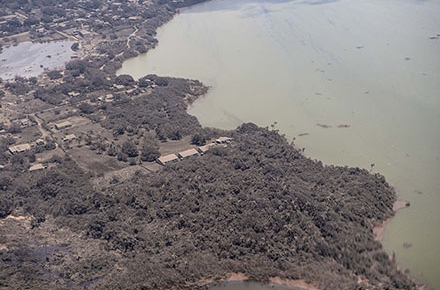“Deep concern” for cut off Tonga
Two Tongan academics at The Australian National University (ANU) say panic and a lack of clear information are hampering search and rescue efforts in the wake of the eruption of the Hunga-Tonga-Hunga-Ha’apai volcano.
Researcher Dr Gemma Malungahu and PhD scholar Amelia Faotusia, both from the ANU Department of Pacific Affairs, are deeply concerned about family and friends as aid from Australia and other nations begins to arrive.
They say Tongans are also concerned about the risk of aid deliveries spreading COVID-19 to the island which is free of the virus.
The volcano eruption could be seen from numerous satellites and also triggered a tsunami on the shores of Tonga and cut off phone and internet lines for the entire island.
Dr Malungahu said there has been panic in and around the capital, Nuku’alofa, and no clear information on the extent of the damage across the rest of the country.
“It is evident that our most vulnerable will be in need of urgent assistance such as our children, pregnant women, elderly and people with disability,” Dr Malungahu said.
“The only communication lines open are those from the High Commission in Australia and New Zealand, but there has been no communication made with family and friends.
“There needs to be clearer communication lines opened so we can know the extent of the disaster on the land and its people.”
Ms Faotusia described the situation in her home country as “sad and very difficult”.
“The eruption has also left a thick layer of ash over the land which has potentially contaminated drinking water and I understand that donors and development partners, including Australia and New Zealand, are working to provide urgent humanitarian assistance,” she said.
“Tonga is incredibly vulnerable to a whole host of development and environmental challenges, including climate change, but I think for many locals, it would be their first experience of a natural disaster of this nature and scale.
“However, as with many Tongans I know, I believe our people are resilient and, as with other natural disasters that have befallen our land, will recover and rise from the ashes.”
Dr Amanda Watson, also from the ANU Department of Pacific Affairs, has been researching undersea internet cables in the Pacific region, and said international communication was severely hampered by damage to the one undersea cable, which could take more than a week to restore.
“This massive volcanic eruption has highlighted the importance of telecommunications and internet access in and with Pacific island nations,” Dr Watson said.
“Perhaps this may provide the impetus for Australia, New Zealand and other key aid donors to work together to develop a comprehensive plan for ensuring that each island nation has effective communications systems and backups.
“Like some other Pacific island countries such as Vanuatu and Niue, Tonga has only one undersea internet cable. It would be ideal if each country could have more than one cable, in order to provide for some redundancy in the event that one cable is damaged.”
Dr Malungahu said time will tell how Tonga recovers from this disaster, with the majority of its population of Christian faith.
“There have been prayer requests made for the country and its people. Live radio stations such as the Pasifika radio and TV have provided a platform for Tongan people in the diaspora, particularly in Australia and New Zealand, a space for people to share their concerns as well as encourage others who have had no contact from their loved ones in Tonga.
“We pray for all of Tonga during this difficult time,” she said.
Story: Michael Weaver
Photo: View of Nomuka, Tonga, covered in ash from the volcano. Credit: New Zealand Defence Force







